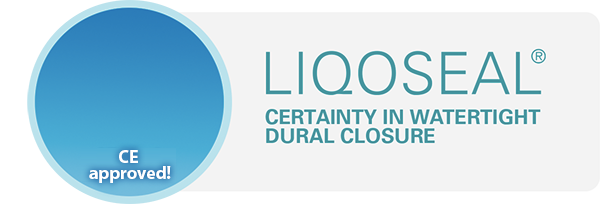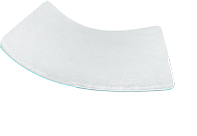Polyganics Awarded €1.2 Million for Clinical Development of Liver and Pancreas Sealant Patch
Groningen, The Netherlands, 13 May 2020 – Polyganics, a medical technology company developing, manufacturing and commercializing bioresorbable medical devices, announced today that it has received EUR 1.2 million in funding from the European Fund for Regional Development (EFRO) through the Northern Netherlands Alliance (SNN) and the city and province of Groningen, to support clinical validation of its Liver and Pancreas Sealant Patch. The grant will support a safety and performance study, which is scheduled to take place later this year in multiple renowned clinical centres across Europe.
Polyganics’ easy-to-use device is made of the Company’s synthetic and safe bioresorbable polymers and optimized to effectively adhere to and seal-off the surgically treated tissue throughout the critical healing period after hepato-pancreato-biliary (HPB) surgery. The patch functions both as a sealant, withstanding the impact of aggressive bile and pancreatic fluids, and as a hemostat, controlling mild-to-moderate bleeding. It is being developed in close association with the surgical department of the University Medical Center Hamburg-Eppendorf (UKE), Germany, and with MercachemSyncom, a contract research organization located in Groningen.
EFRO aims to strengthen the regional economy by supporting local businesses to improve their competitive position, economic growth, and sustainable development, as well as by increasing employment opportunities. As the first product in Polyganics’ General Surgery portfolio, the innovative Liver and Pancreas Sealant Patch is integral to the Company’s growth strategy. It will pave the way for additional future applications in the field, increasing the strength and breadth of the Company’s offering.
IJzebrand Rijzebol, member of the Provincial Executive of Groningen, commented: “We are proud to be able to support innovative companies that provide and inspire future investment in our region. Polyganics is an exemplary candidate for this grant, having enjoyed continued success in R&D, manufacturing and commercialization of medical devices, and provided attractive employment opportunities in Groningen for over 20 years. We congratulate the team and wish them luck with the upcoming study.”
Rudy Mareel, CEO of Polyganics, commented: “We are grateful to the EU, SNN and city and province of Groningen for their support towards progressing our Liver and Pancreas Sealant Patch into the next phase of development, particularly in the current unprecedented climate resulting from COVID-19. The grant is testament both to the quality of the preclinical data for this product, and to Polyganics’ strong growth outlook. As demand for products throughout our existing commercial portfolio continues to increase, we are pleased to be expanding into the challenging area of General Surgery, as we strive to provide unique bioresorbable medical devices to address unmet clinical needs.”
– ENDS –
For more information please contact:
Polyganics
Paul Roos, Chief Financial Officer
Romke Ribbels, Director Marketing & Business Development
T: +31 50 588 65 88
E: info@polyganics.com
Instinctif Partners
Dr Christelle Kerouedan / Dr Katie Duffell
T: +44 (0)20 7457 2020
E: polyganics@instinctif.com
Notes to editors
About Polyganics
Polyganics is a medical technology company with multiple versatile polymer platforms. The company develops, manufactures and commercializes innovative bioresorbable medical devices that facilitate tissue repair and regeneration.
Polyganics’ portfolio comprises of products developed in-house and in collaboration with leading medical technology companies and academic centers of excellence. The portfolio includes marketed products in the fields of Peripheral Nerve Repair (PNR) and Neurosurgery: VIVOSORB®, for minimizing unwanted tissue adhesions after surgery; NEUROLAC®, for supporting PNR following hand surgery; NEUROCAP®, for the management of symptomatic neuromas; and LIQOSEAL®, a dura sealant patch for the effective control of cerebrospinal fluid leakage. Products in development include a Liver and Pancreas Sealant Patch in the field of General Surgery.
In 2014, Polyganics sold its Ear, Nose & Throat (ENT) surgery business unit (the NASOPORE® product family including HEMOPORE®, SINUPORE® and OTOPORE® and NASOPORE-FD®) to Stryker, one of the world’s leading medical technology companies. Polyganics continues to manufacture the NASOPORE® product range for Stryker.
Polyganics is a privately held company based in Groningen, The Netherlands, a center of biomedical engineering excellence, where it has an ISO 13485-certified manufacturing facility. The company’s polymer platform technologies are protected by a broad portfolio of patents and its products have received clearance from the US FDA, CE-approval, and approval from CFDA and other international authorities. To date, Polyganics has produced and delivered more than 5 million devices.
For more information, visit: www.polyganics.com, or follow us on LinkedIn: Polyganics BV
About fluid leakage after HPB surgery
Fluid leakage is a common complication of hepato-pancreato-biliary (HPB) procedures and represents a significant healthcare burden. Bile leaks are one of the most common complications after liver resection with incidence rates up to 27%.1 Postoperative pancreatic fistula (POPF) remains the major cause of morbidity after pancreatic resection, affecting up to 41% of cases.2 With life-threatening consequences such as infection, abdominal abscesses and sepsis, post-operative bleeding and leakage of aggressive enzymatic fluids into the abdominal cavity result in increased morbidity and mortality, prolonged hospital stays and enhanced costs. There are currently no approved and clinically effective treatment options to reduce fluid leakage after HPB surgery.
About Polyganics’ Liver and Pancreas Sealing Patch
Polyganics’ Liver and Pancreas Sealing Patch is an easy-to-use and 100% synthetic device, made of the Company’s bioresorbable and biologically safe polymers. The patch is optimized to significantly reduce fluid leakage during the critical healing period after HPB surgery, as a sealant, withstanding the impact of aggressive bile and pancreatic fluids, and as a hemostat, reducing bleeding.
The patch is the first product in Polyganics’ General Surgery portfolio and was designated as a Breakthrough Device by the US Food and Drug Administration (FDA) in 2018. It is currently under pre-clinical development, in close association with the surgical department of the University Medical Center Hamburg-Eppendorf (UKE).
For more information, visit: https://polyganics.com/portfolio/general-surgery/
References
- Spetzler VN, Schepers M, Pinnschmidt HO, Fischer L, Nashan B, Li J. The incidence and severity of post-hepatectomy bile leaks is affected by surgical indications, preoperative chemotherapy, and surgical procedures. Hepatobiliary Surg Nutr. 2019 Apr;8(2):101-110
- Bassi C, Marchegiani G, Dervenis C, Sarr M, Abu Hilal M, Adham M, Allen P,Andersson R, Asbun HJ, Besselink MG, Conlon K, Del Chiaro M, Falconi M, Fernandez-Cruz L, Fernandez-Del Castillo C, Fingerhut A, Friess H, Gouma DJ, Hackert T, Izbicki J, Lillemoe KD, Neoptolemos JP, Olah A, Schulick R, Shrikhande, SV, Takada T, Takaori K, Traverso W, Vollmer CR, Wolfgang CL, Yeo CJ, Salvia R, Buchler M; International Study Group on Pancreatic Surgery (ISGPS). The 2016 update of the International Study Group (ISGPS) definition and grading of postoperative pancreatic fistula: 11 Years After. Surgery. 2017 Mar;161(3):584-591




